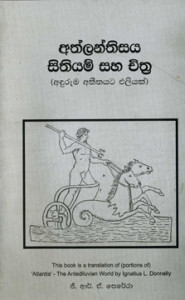Sri Lanka
Taprobane (L)
Taprobane is the name of a legendary island in the Indian Ocean, first mentioned by the Greek historical writer Onesicritus (c.360-290 BC). Although it  is generally accepted to be the island of Ceylon, now Sri Lanka(d), there are dissenting voices such as that of Dhani Irwanto, who insists(a) that Taprobane is to be identified with the Indonesian island of Kalimantan (formerly Borneo), where he also locates Atlantis(b) and the Garden of Eden(c). Irwanto argues against Sumatra being Taprobone, an idea supported by some, such as Arysio Santos who also identified Atlantis as Taprobane.
is generally accepted to be the island of Ceylon, now Sri Lanka(d), there are dissenting voices such as that of Dhani Irwanto, who insists(a) that Taprobane is to be identified with the Indonesian island of Kalimantan (formerly Borneo), where he also locates Atlantis(b) and the Garden of Eden(c). Irwanto argues against Sumatra being Taprobone, an idea supported by some, such as Arysio Santos who also identified Atlantis as Taprobane.
(a) https://atlantisjavasea.com/2015/09/26/taprobana-is-not-sri-lanka-nor-sumatera-but-kalimantan/
(b) https://ahmadsamantho.wordpress.com/2015/06/10/a-new-theory-of-atlantis-disclosed/
(c) https://atlantisjavasea.com/2015/09/07/the-biblical-garden-of-eden-was-in-kalimantan-island/
*(d) https://en.wikipedia.org/wiki/Taprobana*
Perara, G.R.A.
Sri Lanka
Sri Lanka, or more correctly an area to the south of that island, has traditionally been associated with a large submerged civilisation known in Tamil literature as Kumari Kandam. The idea was recently given added impetus in an interesting Internet posting(a). The writer points out that the proto-Greeks came from India, bringing with them their language and other listed cultural attributes, including the tales of sunken landmasses in the region of Sri Lanka. The Sanskrit texts predate Plato with accounts of advanced civilisation in India. More interesting is writing of Panini, a 4th century BC, Sanskrit grammarian who records Greeks in India. This fascinating subject is most certainly worthy of further investigation.
It is not unreasonable to link this lost civilisation with the inundation of Sundaland further east around today’s Indonesia.

